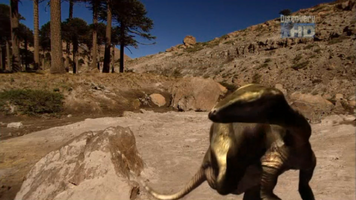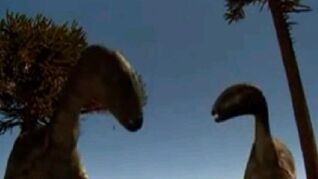No edit summary |
(Adding categories) |
||
| Line 16: | Line 16: | ||
[[Category:Ornithischian dinosaurs]] |
[[Category:Ornithischian dinosaurs]] |
||
[[Category:Jurassic animals]] |
[[Category:Jurassic animals]] |
||
| + | [[Category:Animals]] |
||
| + | [[Category:When Dinosaurs Roamed America animals]] |
||
Revision as of 16:57, 26 July 2018

| |
| Creature information | |
| Scientific name : | Dryosaurus altus |
| Time period : | Late Jurassic |
| Primary diet : | Herbivore |
| In the documentary | |
Dryosaurus (name meaning "Oak Lizard") is a genus of an ornithopod dinosaur that lived in the Late Jurassic period. It was an iguanodont (formerly classified as a hypsilophodont). Fossils have been found in the western United States, and were first discovered in the late 19th century. Known specimens were about 8 to 14 feet (2.4 to 4.3 m) long and weighed 170 to 200 pounds (77 to 91 kg). However, the adult size is unknown, as no known adult specimens of the genus have been found. Dryosaurus had a horny beak and cheek teeth and, like other ornithopods, was a herbivore. Some scientists suggest that it had cheek-like structures to prevent the loss of food while the animal processed it in the mouth. A quick and agile runner with strong legs, Dryosaurus used its stiff tail as a counterbalance. It probably relied on its speed as a main defense against carnivorous dinosaurs.

In When Dinosaurs Roamed America

Dryosaurs feeding
2 remaining Dryosaurus hide under a Camarasaurus. Later, while some more Camarasaurus feed upon the trees, the Dryosaurus pick their scraps of tree leaves. Lastly, the Dryosaurus run from the Ceratosaurus again but are saved by an Allosaurus that kills the Ceratosaurus.
Errors
- Dryosaurus's hands couldn't pivot without breaking them.
- Dryosaurus may of had feathers/quills, but it's still debated.
